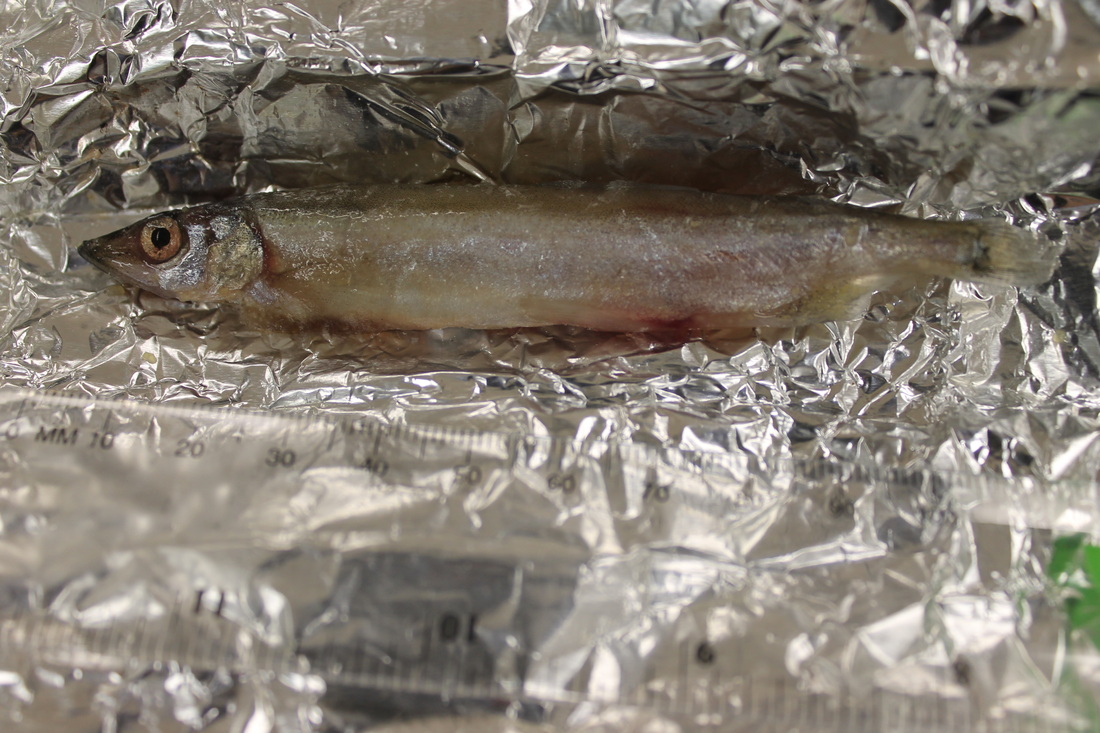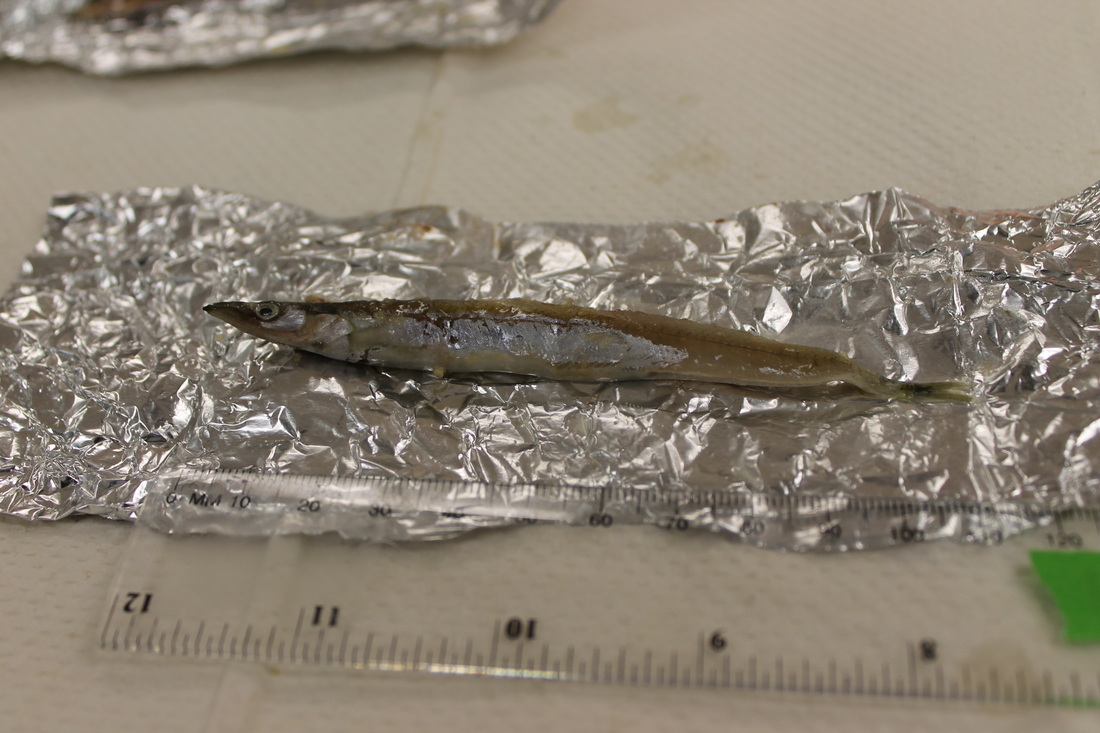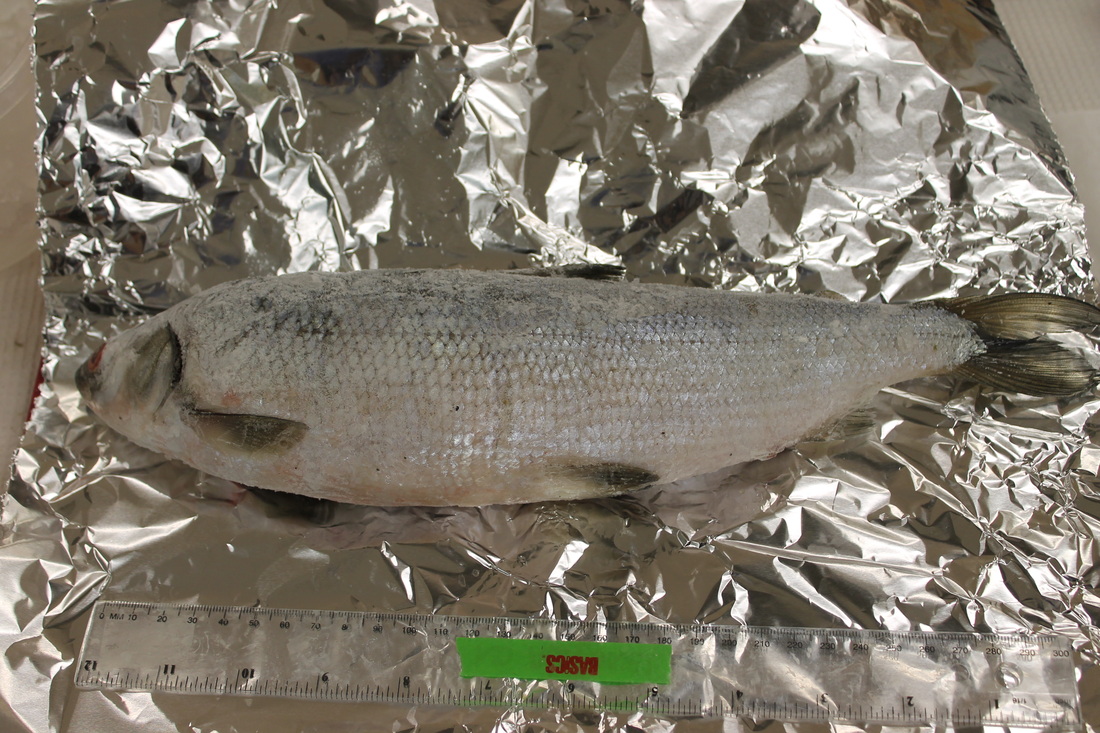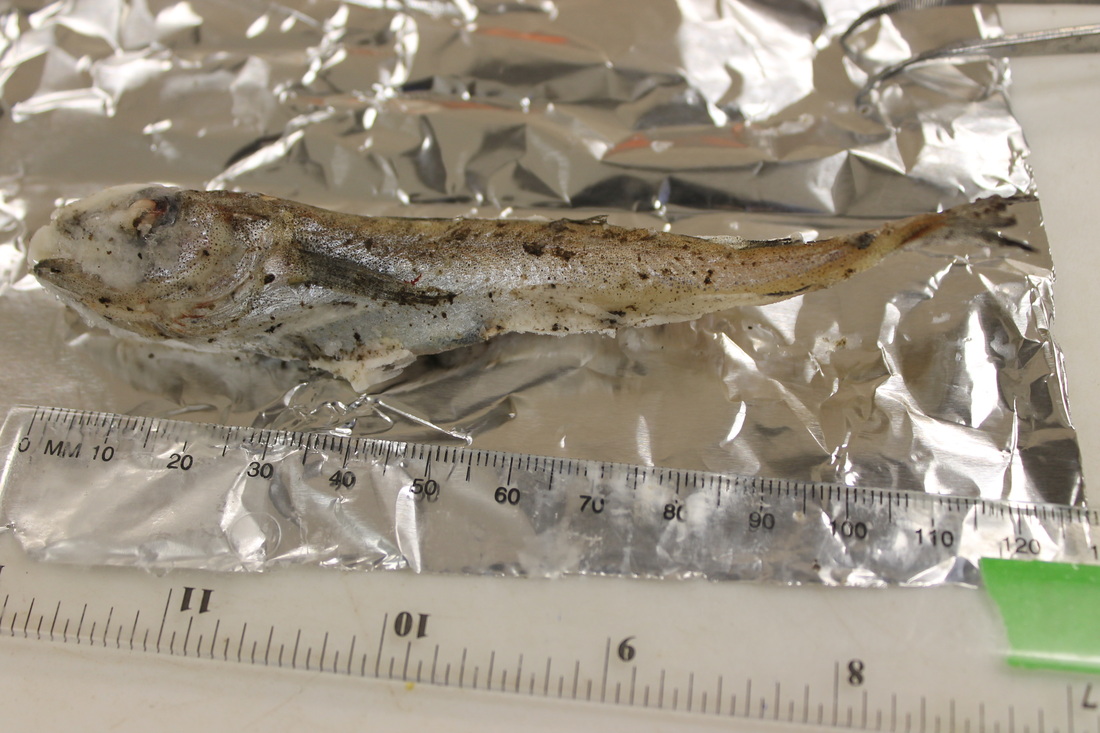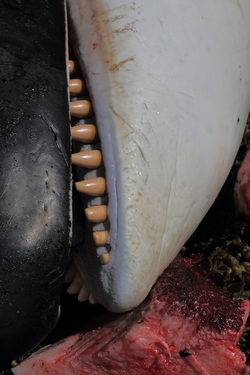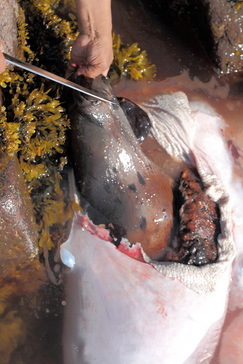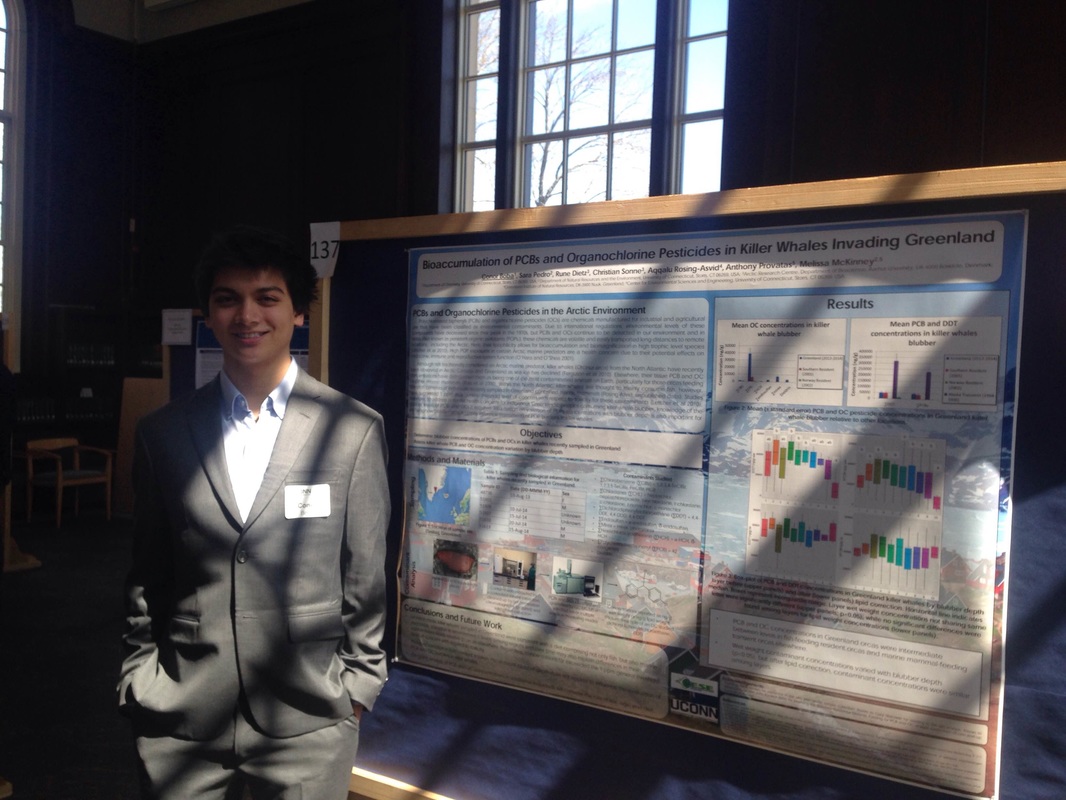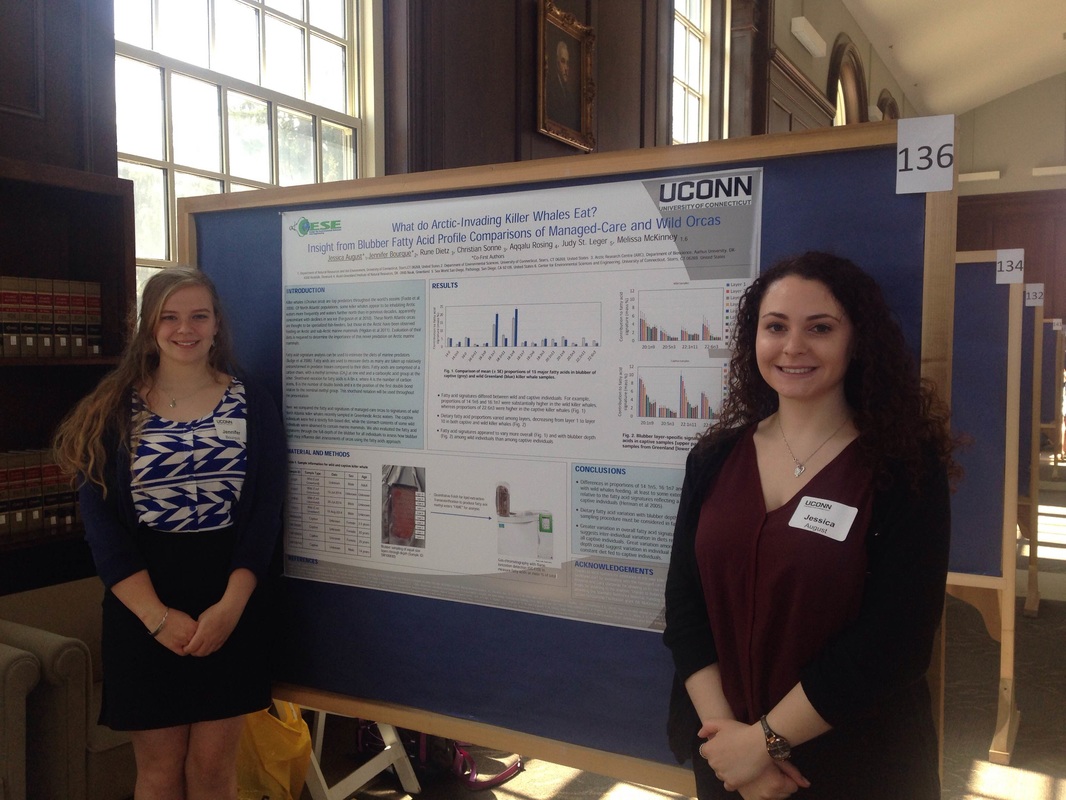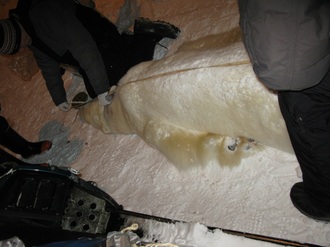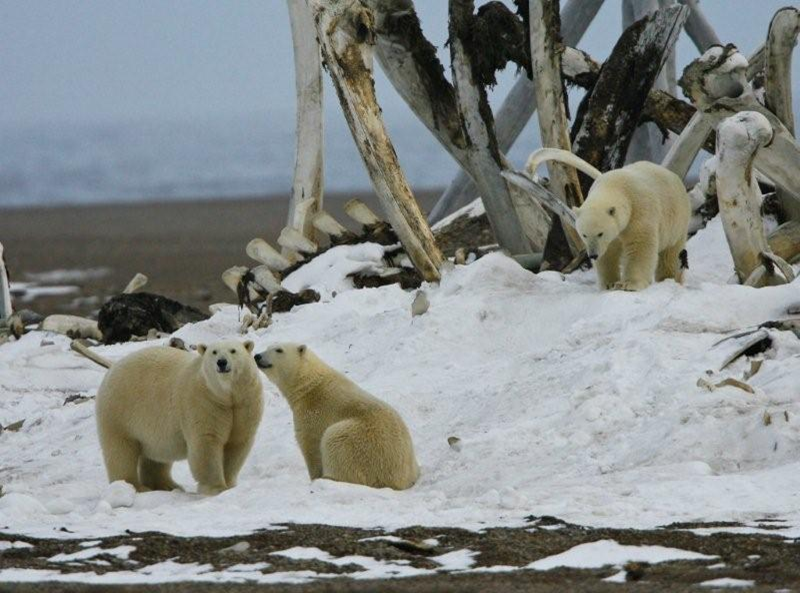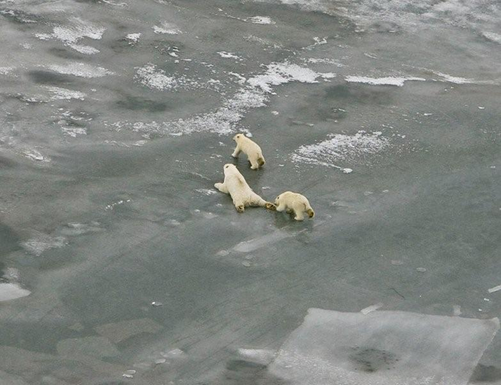Background
Our research program lies within the fields of marine ecology and ecotoxicology, with a focus on the trophic ecology and food webs of Arctic marine fish and mammals, particularly top predators. We use ecological tracers, including stable isotopes and fatty acids, in qualitative and quantitative evaluations of fundamental questions about trophic relationships, habitat use, and feeding habits. This work extends to applied questions regarding the influence of rapid warming and sea ice loss on the feeding and food web relationships of native and non-native species within Arctic marine ecosystems. We further investigate how ecological changes interact with other anthropogenic stressors facing fish and wildlife, particularly pollutants. This program has combined field- and lab-based approaches to successfully identify climate-linked ecological changes in Arctic marine food webs, as well as their ecotoxicological consequences with respect to persistent organic pollutant (POP) and heavy metal exposures.
Selected current and recent research projects
Climate-linked variation in Canadian Arctic prey fish communities and contaminant levels and consequences for marine mammals
In conjunction with warming temperatures and sea ice reductions, there has been a shift from arctic to subarctic forage fish over the past two decades within the eastern Canadian Arctic. Subarctic capelin, sandlance and/or herring are now common in the low Arctic and may be replacing arctic cod. This change has also occurred to a lesser extent in the mid-Arctic, and only very recently have Inuit observations of capelin been made in the high Arctic. These small fish are eaten by larger fish, seabirds, seals and whales. Along with my co-PI on this Northern Contaminants Program-funded project, Dr. Aaron Fisk (University of Windsor, Windsor, Ontario, Canada), we are assessing contaminant levels in these fish and other invertebrates that form the diet of an important Arctic marine mammal, the ringed seal. We are comparing prey contaminant levels among species and across three ecosystems exhibiting differential extents of forage fish changes, specifically, Hudson Bay (low Arctic, Arviat), Baffin Bay (mid-Arctic, Clyde River) and Barrow Strait/Lancaster Sound (high Arctic, Resolute). We are further evaluating the nutritional quality of these fish to provide a more holistic picture of the potential impacts of these changes for Arctic piscivores. Results will provide community-specific information on forage fish contaminant and nutrient levels and represent a necessary initial step in determining impacts of regional variation in forage fish in fish-feeding marine organisms.
Our research program lies within the fields of marine ecology and ecotoxicology, with a focus on the trophic ecology and food webs of Arctic marine fish and mammals, particularly top predators. We use ecological tracers, including stable isotopes and fatty acids, in qualitative and quantitative evaluations of fundamental questions about trophic relationships, habitat use, and feeding habits. This work extends to applied questions regarding the influence of rapid warming and sea ice loss on the feeding and food web relationships of native and non-native species within Arctic marine ecosystems. We further investigate how ecological changes interact with other anthropogenic stressors facing fish and wildlife, particularly pollutants. This program has combined field- and lab-based approaches to successfully identify climate-linked ecological changes in Arctic marine food webs, as well as their ecotoxicological consequences with respect to persistent organic pollutant (POP) and heavy metal exposures.
Selected current and recent research projects
Climate-linked variation in Canadian Arctic prey fish communities and contaminant levels and consequences for marine mammals
In conjunction with warming temperatures and sea ice reductions, there has been a shift from arctic to subarctic forage fish over the past two decades within the eastern Canadian Arctic. Subarctic capelin, sandlance and/or herring are now common in the low Arctic and may be replacing arctic cod. This change has also occurred to a lesser extent in the mid-Arctic, and only very recently have Inuit observations of capelin been made in the high Arctic. These small fish are eaten by larger fish, seabirds, seals and whales. Along with my co-PI on this Northern Contaminants Program-funded project, Dr. Aaron Fisk (University of Windsor, Windsor, Ontario, Canada), we are assessing contaminant levels in these fish and other invertebrates that form the diet of an important Arctic marine mammal, the ringed seal. We are comparing prey contaminant levels among species and across three ecosystems exhibiting differential extents of forage fish changes, specifically, Hudson Bay (low Arctic, Arviat), Baffin Bay (mid-Arctic, Clyde River) and Barrow Strait/Lancaster Sound (high Arctic, Resolute). We are further evaluating the nutritional quality of these fish to provide a more holistic picture of the potential impacts of these changes for Arctic piscivores. Results will provide community-specific information on forage fish contaminant and nutrient levels and represent a necessary initial step in determining impacts of regional variation in forage fish in fish-feeding marine organisms.
|
Not-so-rare killer whales in Greenland: feeding strategies and contaminant accumulation
Recent increases in sightings of killer whales in parts of the Arctic may be linked to decreases in sea ice. Killer whales are top predators that may have specialized diets of marine mammals or fish. Killer whales in the North Atlantic are less studied than those in the North Pacific. In collaboration with Dr. Rune Dietz and Dr. Christian Sonne (Danish National Environmental Research Institute (NERI, Aarhus University in Roskilde) and Dr. Aqqalu Rosing-Asvid (Greenland Institute of Natural Resources), with funding from SeaWorld and Busch Gardens Conservation Fund and UConn's Institute for Biological Risk and UConn's Scholarship Facilitation Fund, we are investigating diets (using fatty acid analysis) and contaminant burdens of killer whales opportunistically sampled during subsistence hunts or stranding events in Southeast Greenland. We will also examine detailed profiles of fatty acids and contaminants through the blubber layer to investigate physiological, temporal, and biochemical aspects of nutrient and contaminant deposition in blubber. These findings will suggest the impact of the predation of killer whales on resident Arctic marine mammal populations including narwhals, as well as potential alterations in human contaminant exposures from consumption of killer whales. In collaboration with Anna Roos (Greenland Institute for Natural Resources), we are planning to further evaluate the fatty acid signatures of a broad-range of sub-Arctic marine mammals, and investigating their use as potential prey for killer whales feeding in Greenland. (Photo credit: A. Rosing-Asvid) |
|
Long-term trends in East Greenland polar bear feeding ecology and consequences for exposure to POPs
With Dr. Rune Dietz and Dr. Christian Sonne from the Danish National Environmental Research Institute (NERI, Aarhus University in Roskilde), we are working on one of the most extensive time series of contaminant trends and effects measurements to date in polar bears from East Greenland, along with Dr. Robert Letcher (Environment Canada, Ottawa, Ontario, Canada). With Dr. Sara Iverson (Dalhousie University, Halifax, Nova Scotia, Canada), we are examining fatty acid profiles in this subpopulation. We use Quantitative Fatty Acid Signature Analysis (QFASA; Iverson et al 2004) models to estimate the prey composition in East Greenland polar bear diets over three decades. At Dr. Aaron Fisk's lab (University of Windsor, Windsor, Ontario, Canada), we also applied a novel additional technique to track these changes called compound-specific isotopes analysis (CSIA). We have shown how long-term changes in prey composition impact POP burdens in polar bears. This time series began in the early 1980s and ran through 2011. We are now extending this dataset further through 2016. On-going work also includes improving the model estimates by broadening and augmenting the East Greenland prey library. |
Feeding ecology, body condition and contaminant exposures in southern Beaufort Sea polar bears during a period of increasing land use
Body condition is a key metric for assessing wildlife health and also for determining body burdens of contaminants. Several body condition metrics have been investigated in polar bears, but none of the approaches are easily applied to generating comprehensive circumpolar and (retrospective) long-term temporal assessments of polar bear body condition. I am leading a project funded by the US Geological Survey,and collaborating with researchers including Dr. Todd Atwood and Dr. Lily Peacock at the US Geological Survey, Alaska Science Center, to develop biochemical measures of body condition. We are also assessing diets of these bears using fatty acid signatures, and evaluating the relationships between diet, body condition, habitat use, and contaminant exposures. Future work will quantify feeding on novel prey items due to changing foraging areas, including onshore food items (Photo credit: USGS)
Body condition is a key metric for assessing wildlife health and also for determining body burdens of contaminants. Several body condition metrics have been investigated in polar bears, but none of the approaches are easily applied to generating comprehensive circumpolar and (retrospective) long-term temporal assessments of polar bear body condition. I am leading a project funded by the US Geological Survey,and collaborating with researchers including Dr. Todd Atwood and Dr. Lily Peacock at the US Geological Survey, Alaska Science Center, to develop biochemical measures of body condition. We are also assessing diets of these bears using fatty acid signatures, and evaluating the relationships between diet, body condition, habitat use, and contaminant exposures. Future work will quantify feeding on novel prey items due to changing foraging areas, including onshore food items (Photo credit: USGS)
We are also currently working on projects with Kristin Laidre (University of Washington) on polar bear foraging behavior and feeding habits in Baffin Bay and southeast Greenland, with Tracy Rittenhouse (University of Connecticut) on snapping turtle contaminant loads across Connecticut, and with Todd Atwood (US Geological Survey) and Sarah Perkins (Cardiff University) on stressor interactions with polar bear gut microbiota, among others! Please contact Melissa for more information!
Last updated: May 2018
All content © M. McKinney unless otherwise indicated - All header photos: © Anaïs Remili
All content © M. McKinney unless otherwise indicated - All header photos: © Anaïs Remili

